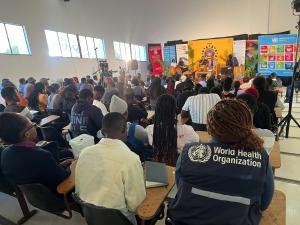World Health Organization supports bushfire live dialogues at the University of Eswatini, focusing on mental health challenges
Mbabane—In the vibrant heart of the University of Eswatini, Kwaluseni campus, a lively community hall bustled with energy, ready for the MTN Bushfire Live Dialogues. This platform brought together a diverse mix of experts in HIV, GBV, and mental health, alongside young leaders, and community members, all eager to shape conversations pivotal for their future.
Focusing on the health thematic area, mental health, which profoundly affects youth, this session aimed to shed light on the complex realities young Swazis face. The World Health Organization (WHO), in collaboration with other UN agencies in Eswatini, has partnered with Bushfire to leverage their extensive youth following, aiming to reach a broader demographic. This strategic alliance has enabled WHO to get better insights into the country's mental health situation, which has seen a concerning rise in suicide cases both at the university and national levels. In collaboration with the Ministry of Health and UNESWA, WHO will organize a National mental health indaba later in the year to better understand the challenges the youth and the wider population face regarding mental well-being and come up with possible multisector solutions.
As the panelists shared their insights and students posed powerful questions, the room became a space for deep reflection on gender inequity, HIV, gender-based violence, and mental health.
Moderator Ms. Mandisa Zwane from UNESCO set the tone with a compelling opening. "Our country stands at a critical crossroads," she began. "High HIV infection rates among youth, alarming cases of gender-based violence, and rising mental health challenges threaten our future. These issues are interconnected as they feed into each other and demand urgent, holistic action."
Ms. Nomzamo Dlamini from the Deputy Prime Minister’s Office, a passionate advocate for gender equality, nodded in agreement. "Despite our efforts," she said, "inequality persists. It fuels GBV, discourages seeking healthcare, and keeps mental health issues shrouded in stigma and silence."
When the discussion turned to HIV, the panel highlighted strategies for prevention and support. Dr. Bongani Masango from NERCHA emphasized, "Prevention starts with education, youth-friendly services, and accessible tools. But de-stigmatization is key, and if young people feel safe to seek help, progress becomes possible." He also pointed out the challenge of intergenerational relationships, often leaving young people vulnerable, especially when older partners exploit their trust or influence in intimate matters.
The conversation then delved into GBV, a crisis plaguing many communities. Ms. Nosipho Storer underscored, "Addressing GBV requires education, strong legal responses, and community involvement. We must challenge harmful cultural norms and actively include men and boys in promoting respect." She highlighted the importance of accessible services, i.e., shelters, legal aid, counseling, and the need for these to be well-known within communities. "Empowering communities starts with changing attitudes from the ground up."
As discussions deepened, mental health emerged as a pressing concern. National focal point for mental health at the Ministry of Health, Ms. Sindiso Bhembe, called for systemic change: "Integrating mental health into primary healthcare, schools, and workplaces can help reduce stigma and promote early intervention. We must boost community awareness through campaigns and education."
The interconnectedness of these issues was unmistakable. Ms. Zwane explained, "Experiencing GBV can lead to mental health issues and increase vulnerability to HIV as these problems reinforce each other, creating a cycle that's hard to break." She stressed that only a comprehensive, integrated approach, combining services, community outreach, and youth participation, can truly be effective.
The young audience was actively engaged, sharing their experiences and raising concerns. One young woman passionately asked, "Even with awareness of HIV prevention, peer pressure and poverty put us at risk. How do we fight that?" Dr. Bongani responded thoughtfully, "Empowering youth economically and socially is vital as it helps reduce these vulnerabilities."
Another participant raised the challenge of community norms and a lack of safe reporting spaces for GBV, emphasizing how silence perpetuates the problem. Mental health also struck a chord, with a young man asking why suicide and depression rates are climbing among peers. Ms. Promise Dlamini from the Ministry of Health responded with compassion, "Creating safe spaces, listening to young people's struggles, and making mental health services accessible can save lives."
As the session drew to a close, the panelists called for unity. Ms. Zwane summarized, "We can't afford to address these crises in isolation. Our strength lies in integrated strategies, working together as communities, governments, and individuals. Only then can we build a future where every young person can thrive free from violence, stigma, and despair."
The room left inspired and reminded that tackling these deep-rooted issues demands collective effort, compassion, and unwavering resolve. Because the health and dignity of today’s youth shape the destiny of our nation.

